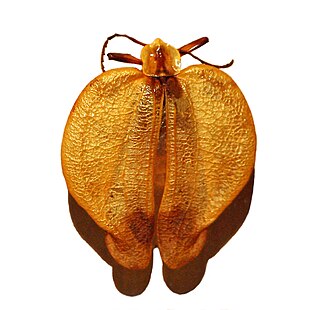| Calocosmus | |
|---|---|
| Scientific classification | |
| Kingdom: | Animalia |
| Phylum: | Arthropoda |
| Class: | Insecta |
| Order: | Coleoptera |
| Family: | Cerambycidae |
| Subfamily: | Lamiinae |
| Genus: | Calocosmus |
Calocosmus is a genus of longhorn beetles of the subfamily Lamiinae, [1] containing the following species:
A genus is a taxonomic rank used in the biological classification of living and fossil organisms, as well as viruses, in biology. In the hierarchy of biological classification, genus comes above species and below family. In binomial nomenclature, the genus name forms the first part of the binomial species name for each species within the genus.

The longhorn beetles are a cosmopolitan family of beetles, typically characterized by extremely long antennae, which are often as long as or longer than the beetle's body. In various members of the family, however, the antennae are quite short and such species can be difficult to distinguish from related beetle families such as the Chrysomelidae. The family is large, with over 26,000 species described, slightly more than half from the Eastern Hemisphere. Several are serious pests. The larvae, called roundheaded borers, bore into wood, where they can cause extensive damage to either living trees or untreated lumber. A number of species mimic ants, bees, and wasps, though a majority of species are cryptically colored. The rare titan beetle from northeastern South America is often considered the largest insect, with a maximum known body length of just over 16.7 cm (6.6 in). The scientific name of this beetle family goes back to a figure from Greek mythology: after an argument with nymphs, the shepherd Cerambus was transformed into a large beetle with horns.

Lamiinae, commonly called flat-faced longhorns, are a subfamily of the longhorn beetle family (Cerambycidae). The subfamily includes over 750 genera, rivaled in diversity within the family only by the subfamily Cerambycinae.
- Calocosmus chevrolati Fisher, 1925
- Calocosmus contortus Lingafelter, 2013
- Calocosmus dimidiatus (Chevrolat in Guérin-Méneville, 1838)
- Calocosmus fulvicollis Fisher, 1925
- Calocosmus hispaniolae Fisher, 1925
- Calocosmus janus Bates, 1881
- Calocosmus magnificus Fisher, 1932
- Calocosmus marginipennis Gahan, 1889
- Calocosmus melanurus Gahan, 1889
- Calocosmus nigripennis Chevrolat, 1862
- Calocosmus nigritarsis Fisher, 1942
- Calocosmus nuptus Chevrolat, 1862
- Calocosmus punctatus Lingafelter, 2013
- Calocosmus rawlinsi Lingafelter, 2013
- Calocosmus robustus Lingafelter, 2013
- Calocosmus semimarginatus Bates, 1881
- Calocosmus speciosus Chevrolat, 1862
- Calocosmus venustus (Chevrolat in Guérin-Méneville, 1838)
Calocosmus chevrolati is a species of beetle in the family Cerambycidae. It was described by Fisher in 1925. It is known from Cuba.
Calocosmus contortus is a species of beetle in the family Cerambycidae. It was described by Lingafelter in 2013.
Calocosmus dimidiatus is a species of beetle in the family Cerambycidae. It was described by Chevrolat in 1838. It is known from Cuba.









